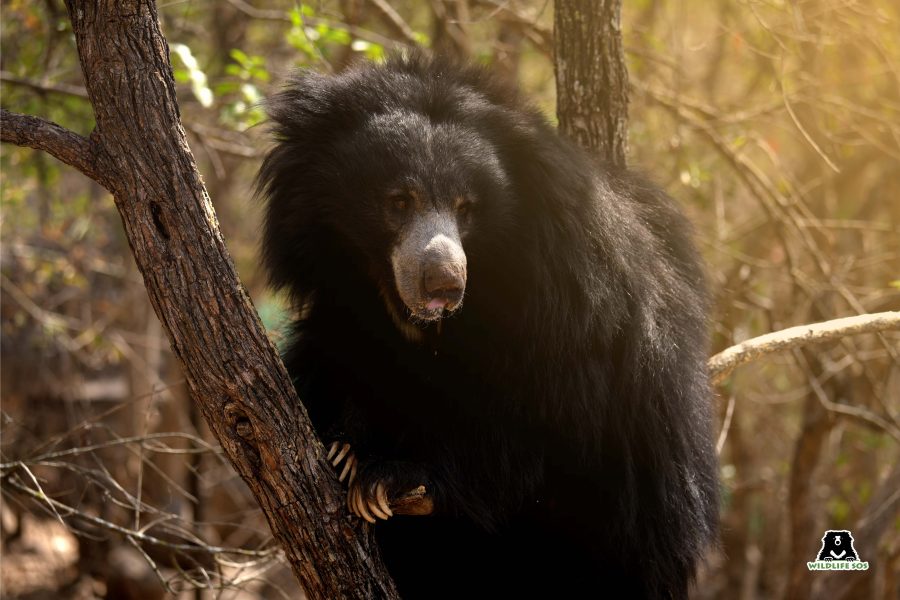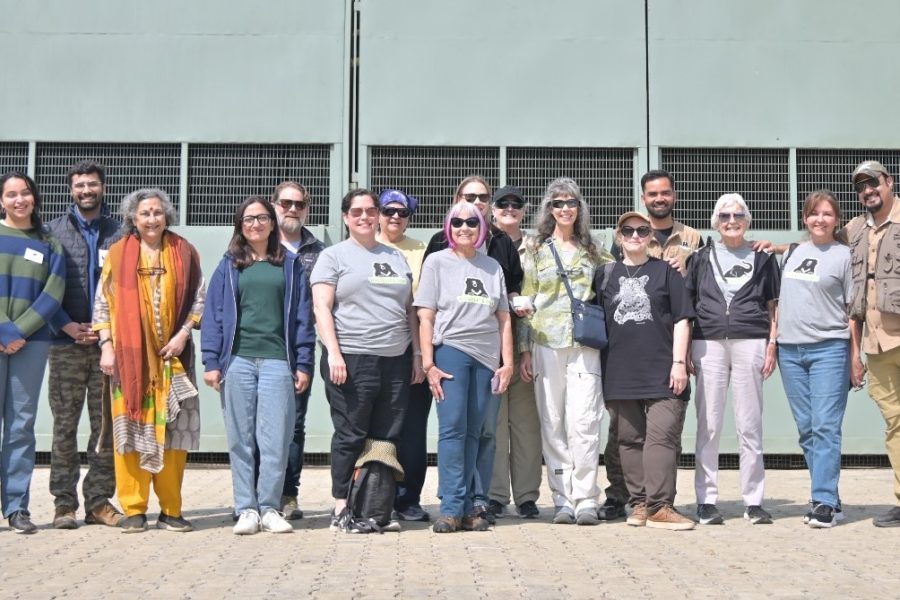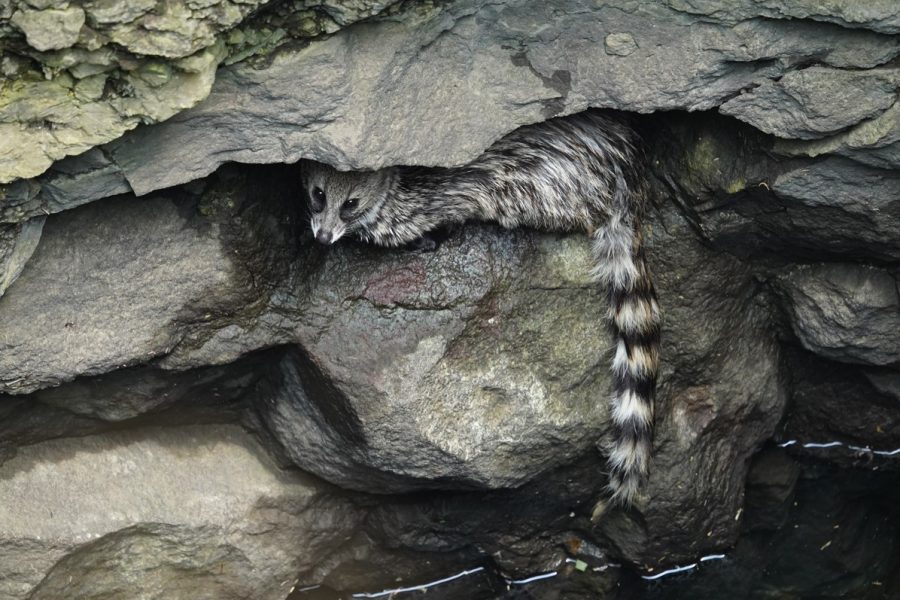December 18, 2009, Bangalore, India “ The Ministry of Environment and Forests, Government of India and the state forest departments, Delhi headquartered non-profit Wildlife SOS, with its US and UK arms, and a coalition of international conservation and animal rescue groups, Free the Bears Fund (FTB) from Australia, International Animal Rescue (IAR) from the UK and One Voice Association France, is about to make animal welfare history by taking the last dancing bears off the streets of India – bringing an end to a centuries-old tradition that inflicted terrible cruelty on thousands of highly endangered sloth bears.
Today, at Bannerghatta Bear Rescue Centre near Bangalore, one of the last dancing bears in India was surrendered to Wildlife SOS by his owner. The rope that kept Raju the bear captive as a “dancing bear” for nearly three years was removed, and he started on his way to a new life. Likewise, his owner Raje Saab was given a rehabilitation package which will allow him to earn a better living for his family, and will ensure that his children are educated.
Till now about 600 performing bears have been rescued and given a permanent home and lifetime care in Wildlife SOS rehabilitation centres throughout India. This is simultaneous to providing a rehabilitation package for the bear handlers, known as kalandars, so that they can learn new trades and continue supporting their families after surrendering their bears. For the first time Kalandar children are able to attend school and receive an education sponsored by the Kalandar Rehabilitation Project.
Geeta Seshamani, Co-Founder of Wildlife SOS, said “Thanks to assistance from the Ministry of Environment and Forests, the Government of India and the state forest departments – and our supporters around the world – it has taken less than a decade to bring an end to this barbaric practice and give the bears and the kalandar community a second chance in life.â€
Kartick Satyanarayan, Co-Founder of Wildlife SOS, said: “This event is of huge historic significance in India and cause for real celebration. No longer will India be tainted by the shocking spectacle of captive bears being beaten on the roadside or dragged miserably through the traffic and dust by a rope through their noses. It is time for everyone who has supported this project to rejoice at what we have achieved.â€
The practice of dancing bears was made illegal in India when the Wildlife Protection Act of 1972 came into effect. However it wasn’t until the end of 2002, when the Wildlife SOS Agra Bear Rescue Facility (established in collaboration with the Uttar Pradesh Forest Department with support from IAR, FTB, One Voice and other supporter groups) opened its doors, that there was anywhere to house confiscated dancing bears. The first six bears were brought into the centre on Christmas Eve 2002. Since then the project has gone from strength to strength and now boasts four rescue facilities in Agra, Bannerghatta, Bhopal and West Bengal.
With support from One Voice Association France, an extensive anti-poaching network known as “Forest Watch†has also been set up which has effectively curbed poaching of bear cubs by working closely with enforcement agencies such as the police, forest departments and the wildlife crime control bureau. These anti-poaching efforts have drastically reduced the supply of cubs being poached from the wild and sold on the black market.
Alan Knight, Chief Executive of International Animal Rescue, said: “Partnering with Wildlife SOS and the Indian government has led to this momentous achievement. We have always been immensely proud to be part of this project which we will continue to support once all the bears have been rescued.â€
Mary Hutton, Founder of Free the Bears Fund in Australia, said: “At Free the Bears we are overjoyed at the success of this project and are committed to ensuring that the bears are never again forced to dance on the streets of India. Much work remains to be done to provide the rescued bears with the best possible quality of life.”
Muriel Arnal, President of One Voice, said: “One Voice has been working closely with Wildlife SOS to stop poaching of bear cubs through Forest Watch. We are pleased that we have been effective and successful in tracking down poachers and working with enforcement agencies to control this illegal trade. In addition to this, we have also been conducting training workshops for enforcement officers.”
As well as offering bear sponsorships; the coalition also plans to develop responsible conservation education projects in major cities in India to assist with the running costs and the life time care of the rescued bears in the years ahead.
For further information and images, please contact: Kartick Satyanarayan, Wildlife SOS (www.wildlifesos.org): +91 9241271714 +91 9810114563 / +91 9810000254.
EDITOR’S NOTES: With informants across the country, and a recently concluded advertising campaign designed to encourage bear dancers to turn in their bears, Wildlife SOS is confident that there are only about 30 or so remaining dancing bears in India. However, given India’s vast size and rather porous borders, Wildlife SOS recognizes the possibility that there may be a few more dancing bears hidden away in remote areas, or in neighboring countries, and remains firmly committed to rescuing any bears that may be discovered in the future. Wildlife SOS has a national hotline and we need citizens to call us, if they see any more “dancing bears” or any other wildlife crime. Wildlife SOS 24 Hour helpline: (0)9871963535
About Dancing Bears: Dancing bears in India are sloth bears that have been poached from the wild as tiny cubs, often by killing their mother. Sloth bears are listed on Appendix 1 of the Convention on International Trade in Endangered Species (CITES) and all international trade in them is prohibited. As well as being poached for the dancing bear trade, bear parts are thought to have healing properties and bears are highly prized for use in traditional medicines.
Once rescued and taken into one of the sanctuaries, former dancing bears receive specialist veterinary care, enjoy a healthy diet and live with companions in large, forested enclosures. Over time they become healthier and happier. However, the rescued bears can never be returned to the wild because they have not learnt the techniques of survival from their mothers, also the absence of teeth and claws handicap them severely. Last of all they have been imprinted by human beings and have become accustomed to, and reliant on, humans for food. Such bears cannot survive in the wild on their own.
Not so long ago dancing bears were a common sight in well-touristed areas of India, notably along the highway between Delhi and Agra, home of the Taj Mahal . . . Now they are a thing of the past!
Public Statement – The rescue of the last Dancing Bears of India
Wildlife SOS India would like to gratefully acknowledge the invaluable support extended by the Ministry of Environment and Forests, Government of India, Central Zoo Authority, Forest Departments of Uttar Pradesh, Karnataka, Madhya Pradesh, West Bengal, the Zoo authority of Karnataka, Bannerghatta Biological Park and various state and Central Government agencies. We are also deeply thankful to the coalition of international conservation and animal rescue groups: FTB Australia, IAR, UK, One Voice France and Wildlife SOS USA, for making it possible to rescue the last dancing bears off the streets of India and bring a final end to a centuries-old tradition that inflicted terrible cruelty on thousands of highly endangered sloth bears.A heartfelt thank you to every supporter why has stood by us. We are aware of some performing bears still in Nepal and are expected to enter India through border areas. Persons spotting any performing bears must contact Wildlife SOS India helpline +91 9871963535 to have it rescued immediately.





